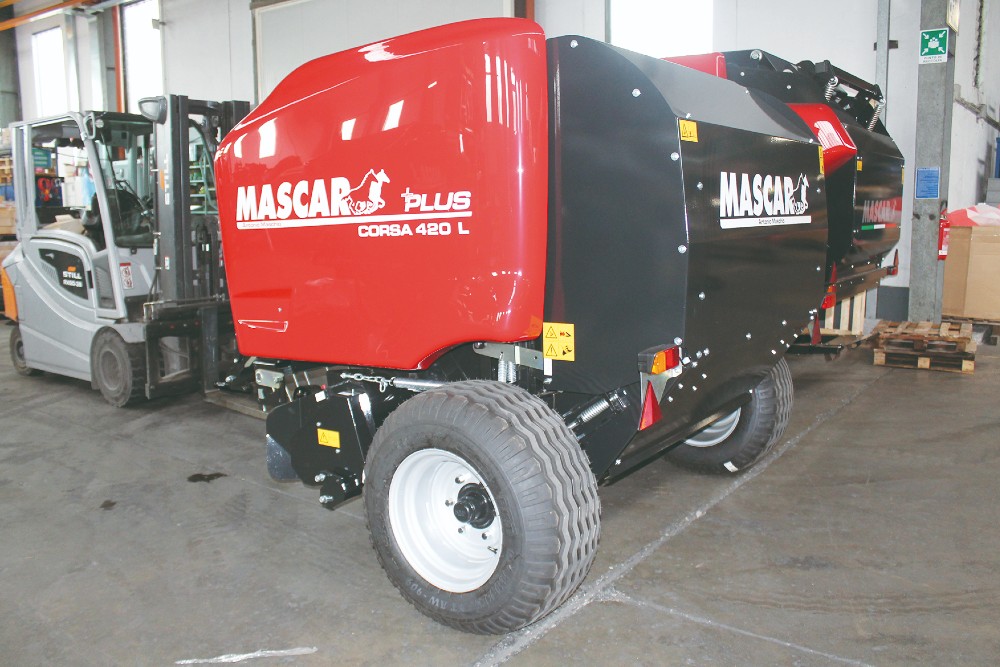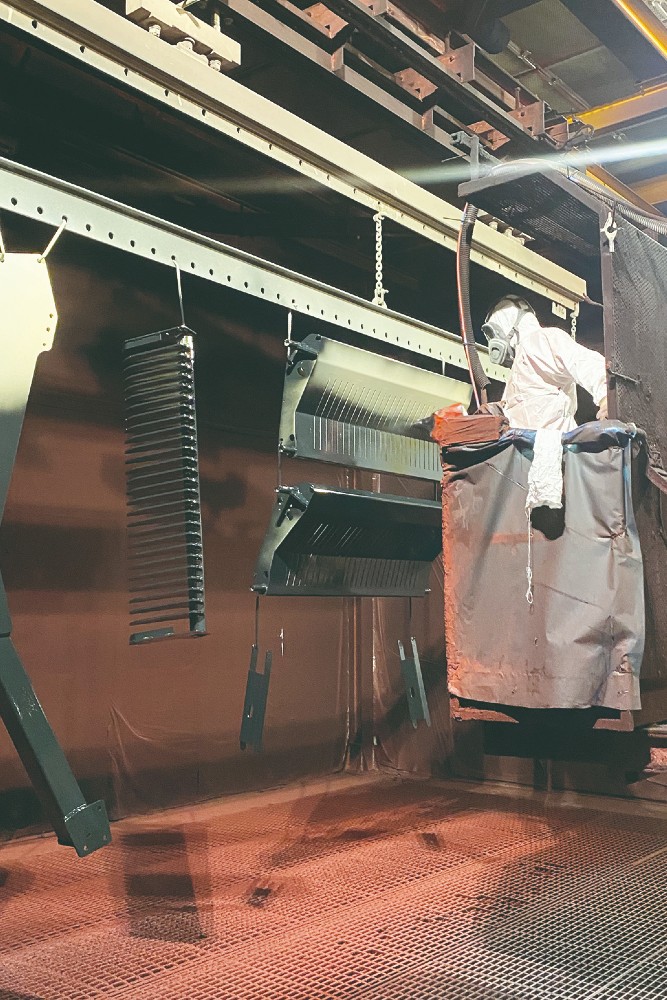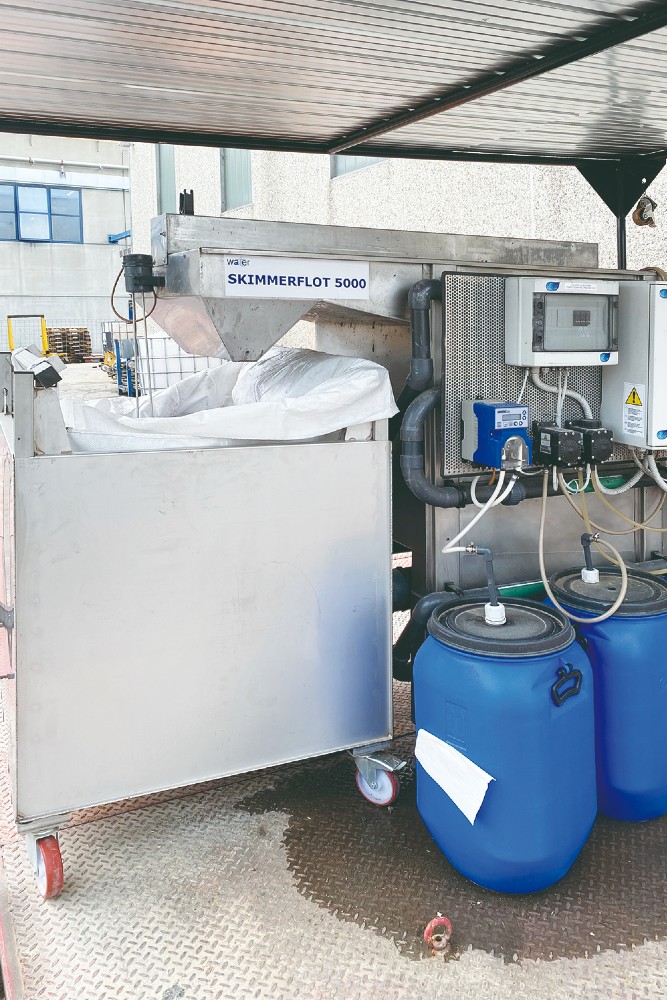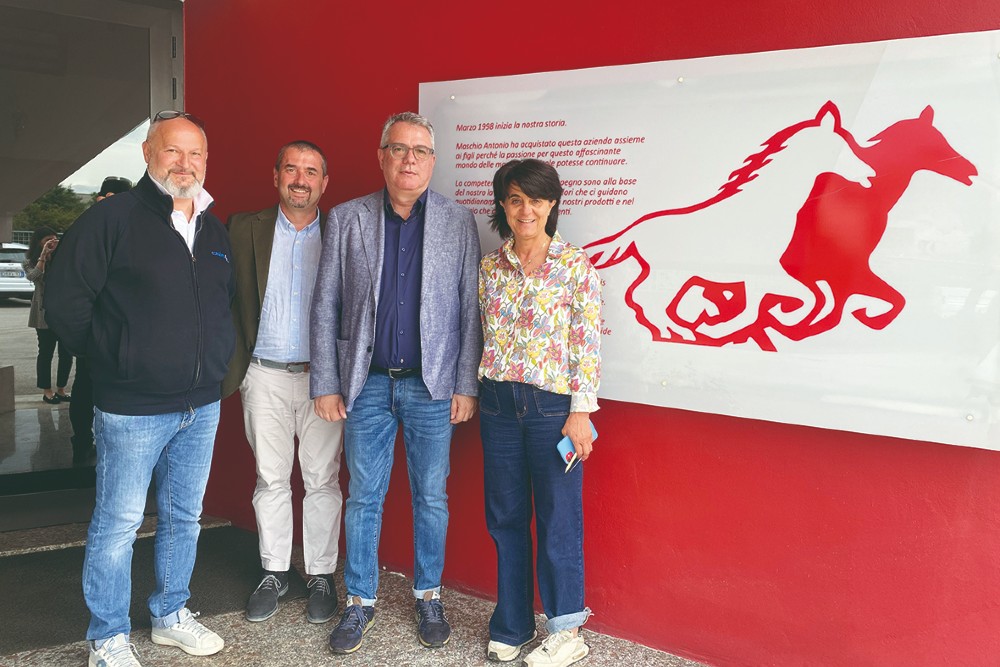To ensure greater efficiency and further commit to sustainability, Mascar turned to industrial water treatment expert Water Energy to clean the liquid that feeds their overspray-capturing water curtains, installing a Skimmerflot 5000 system.
Lean manufacturing is a management approach that aims to optimise efficiency by reducing waste and unnecessary costs while improving the quality and flexibility of production processes. Conceived in Japan in the 1950s, this operating model was made famous by Toyota, which adopted it as the basis of its workflow. Lean production focuses on a philosophy of continuous improvement involving all company levels, from managers to operators, and promoting greater collaboration and communication among all parties. Adopting this approach means not only reviewing every process to eliminate inefficiencies but also focusing on creating value for the customer
as a core concept that is placed at the centre of every activity. Essentially, it is about doing more with less: less resources, less space, less time, and above all, less waste.
In the agricultural machinery sector, implementing lean production principles is a significant step towards innovation. The ability to meet customer needs more quickly and flexibly while maintaining high quality standards is a crucial competitive advantage. It enables companies to respond to the challenges of today’s market, which is increasingly focused on customisation, data control, and sustainability, by optimising their entire production processes and ensuring superior end products.
Mascar, a leading manufacturer of seeding and haymaking machinery that has made lean production one of the factors of its market success, has recently decided to take on some new challenges by investing not only in the continuous optimisation of its production processes but also in environmental sustainability, continuing the “green” evolution process it began in 2011 with the installation of photovoltaic panels (which meet about 50% of the energy needs of its metalworking department and 60% of those of the coating and assembly areas).
In the coating department, in particular, this resulted in the installation of an advanced water treatment system for the liquid coming from the application booths’ overspray-capturing water curtains. For this project, Mascar turned to Water Energy
(San Pietro in Casale, Bologna, Italy), a company recognised for its expertise in the industrial water treatment sector, which suggested implementing a process to remove sludge from overspray-polluted water with a Skimmerflot device and revamping the existing scrubber system to reduce the maintenance and replacement intervals of paint stop filters and droplet separators.
The history of Mascar – a path to success between tradition and innovation
Mascar’s story began in 1998, when Antonio Maschio, a co-founder of the Maschio Gaspardo Group, embarked on a new entrepreneurial adventure by taking over a small local company already active in the agricultural machinery sector. “It was a brave decision, but with his vast experience and expertise, my father was determined to transform Mascar from an artisan business to an industrial enterprise,” explains Maria Teresa Maschio, who now manages the company with her brother Sante Maschio.
“We capitalised on previous know-how to reorganise Mascar in every aspect, focusing on advanced technologies and continuous innovation. Our decision not to follow the path of producing a full line but rather specialise in two well-defined sectors, i.e. haymaking and seeding, has made the difference. It has enabled us to offer top-quality, technologically advanced machines designed for highly demanding market niches.”
 A painted round baler.
A painted round baler.In particular, in the haymaking field, Mascar mainly specialises in round balers and baler wrappers, whereas in the seeding one, it focusses on precision planters, seed drills, front tanks, and cultivators.
In the last few years, Mascar has made significant technological advances to respond to the needs of the agricultural industry, which is constantly evolving and increasingly oriented towards digitalisation.
Indeed, knowledge and control of data are crucial for today’s farmers: having the ability to accurately monitor how many seeds are planted, at what distance, and what the soil conditions are is vital for optimising production and ensuring high yields.
“We have invested heavily in making our machines more digital, equipping them with advanced technologies that provide farmers with the tools they need to monitor crops in real-time, improve productivity, and control costs. These investments have focused on electronics, hydraulics, and mechanics, enabling us to meet new market challenges with a future-oriented vision,” adds Maschio.
“At the same time, Mascar has embarked on a path towards lean production to reduce processing times and increase overall efficiency without compromising quality. This complex project involves our whole organisation, as it entails a philosophy that goes beyond the manufacturing flow: it is a change that also affects our staff’s mindset and working methods. We started with the metalworking department, and we plan to extend this programme to assembly and coating by the end of this year,” states Emanuele Ghezzo, Mascar’s plant manager.
The coating phase was also the subject of an investment aimed at improving sustainability and efficiency while contributing to the Mascar machines’ surface finishing quality. That entailed the revamping of the booths’ air purification system by inserting a floor sludge removal system to reduce the volume of coating sludge to be disposed of and the upgrading of the existing scrubbers to minimise maintenance intervals. Water Energy took care of the whole project.
The coating of agricultural machinery: a cutting-edge technological process
One of the distinctive quality aspects of Mascar’s agricultural machinery is the coating cycle it undergoes, a fundamental component of a technologically advanced production process. This phase not only gives agricultural machinery excellent aesthetics with automotive-degree quality but also plays a crucial role in protecting its substrates, which are constantly exposed to moisture, abrasive soils, and chemicals.
The process begins with a pre-treatment phase including phosphodegreasing, a rinse with mains water, and a rinse with demineralised water. “The pre-treated components are first dried in a dedicated tunnel and then subjected to the masking stage to protect the parts that are not to be coated.”
“In the first booth, devoted to primer application, an operator manually applies a two-component, water-based epoxy primer developed by Sherwin-Williams (Minerbio, Bologna) with state-of-the-art electrostatic equipment. After a flash-off step in a ventilated oven to remove surface moisture, a 2K acrylic top coat is applied on the parts,” Ghezzo explains.
Both booths are equipped with spray guns from Graco’s XP range installed by Comaind (San Giovanni Lupatoto, Verona, Italy), which have enabled Mascar to achieve paint savings of over 30% while improving the quality of its finishes. Mascar also installed dosing and mixing systems developed by Graco. “We supplied a Graco ProMix 2KE dosing unit and a 2KS multi-component system for precise mixing and fast colour changes,” indicates Davide Galvani from Comaind.
 The application of the 2K acrylic top coat.
The application of the 2K acrylic top coat.The water treatment plant: an integral part of an environmentally sustainable philosophy
 The Skimmerflot 5000 plant supplied by Water Energy.
The Skimmerflot 5000 plant supplied by Water Energy.Mascar has recently improved this coating process with a sludge removal system for its booths’ water curtains, a Skimmerflot 5000 plant supplied by Water Energy, which set up the entire chemical water treatment process. “The Skimmerflot unit is designed for the treatment and recirculation of water in coating booths and operates by mechanical separation of the sludge from the liquid. In the flotation process, denatured paint loses its adhesive properties, and thanks to the addition of a special flocculant, it aggregates into flakes that float on the water’s surface. That ensures easy separation and removal of the sludge, preventing it from settling on the bottom of the coating booth’s tank. In the water return circuit, we dose a coagulant that prevents the residual paint from re-aggregating with water, which is recirculated to feed the overspray-capturing water curtains, whereas the paint sludge, mechanically separated and dewatered by the Skimmerflot sludge separator, is collected in big bags ready for disposal,” illustrates Tommaso Ponara, the owner of Water Energy.
“Besides installing its Skimmerflot, Water Energy revamped our existing scrubbers with an air cleaning system featuring self-cleaning bars with hollow cone nozzles that purify the air of residual overspray. After passing through the floor water curtain, the air leaving the booth is conveyed into a channel that runs parallel to the tank and then sent upwards, passing through the scrubbers for further wet cleaning before being recirculated back into the booths.”
The system thus ensures optimal cleaning of the droplet separators and reduces the replacement intervals of the paint stop filters, preventing the emission of potentially harmful solid particles as well as the deposit of dirt particles on the coated workpieces in the booths. The continuous recirculation of clean water keeps the removal system efficient and reduces the amount of water to be disposed of. In addition, the handling of the collected sludge is simplified by the automatic separation process, which reduces its water content and limits the volume of the big bags to be disposed of, resulting in significant cost savings. “Water Energy’s solution has significantly improved our coating line. Recirculating only purified water also makes the protection filters and water recirculation pumps last longer. As a result, we have experienced fewer plant downtimes and greater production continuity,” Ghezzo notes.
In-house production
Mascar handles 95% of the production of its agricultural machinery in-house by carefully following every step of the process, from metalworking and finishing to assembly and shipping. Its two factories, covering a total area of 27,000 m², are equipped with advanced technologies such as DDL fibre laser cutting, CNC machining centres, and welding robots, which enable extremely precise processing of the raw material used, pickled sheet metal.
“Compared with 2019[1], when ipcm® first visited our site, we have switched from a CO2 laser to a DDL fibre laser system, which allows us to cut steel up to 25 mm in thickness four times faster and with significant energy savings,” explains Ghezzo. In addition, the welding department has been updated with state-of-the-art robots, which ensure greater efficiency, precision, and process repeatability. This configuration enables Mascar to monitor every manufacturing stage, ensuring product reliability and reducing time to market. After the metalworking and assembly stages, the products undergo rigorous quality controls and finally reach the coating department.
A successful synergy
“We chose Water Energy on the advice of Comaind, our long-standing partner for coating, which has been with us for decades and has contributed significantly to the growth of Mascar,” indicates Maria Teresa Maschio. “Our collaboration with Comaind dates back to when we transitioned from one-component to two-component paint products, and since then, it has supported us at every stage to improve our application processes and reduce colour change times.”
Last year, Mascar was faced with an issue related to the frequent replacement of paint stop filters in its coating booths, which was significantly increasing operating costs. “We have known Water Energy for years, and after a thorough analysis, we suggested Mascar relied on them for a solution to reduce air filtration costs,” says Galvani from Comaind. “The goal was clear, and together, we managed to hit it.”
 Davide Galvani from Comaind, Tommaso Ponara from Water Energy and Emanuele Ghezzo and Maria Teresa Maschio from Mascar.
Davide Galvani from Comaind, Tommaso Ponara from Water Energy and Emanuele Ghezzo and Maria Teresa Maschio from Mascar.It was to solve this problem that the Bologna-based company revamped the existing scrubbers, thus reducing the need to replace filters and optimising process efficiency.” The resulting partnership goes beyond a mere supply relationship: Water Energy is not just a provider but an actual partner for Mascar. “When you work with people and organisations that share your goals, you feel at home,” Ghezzo concludes.